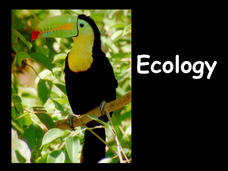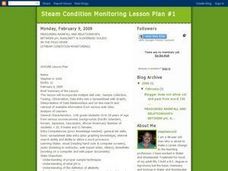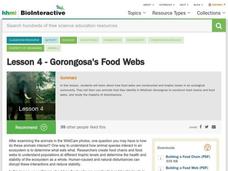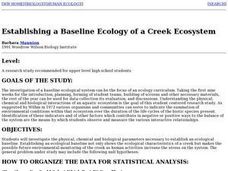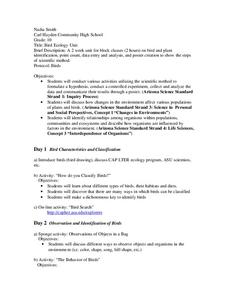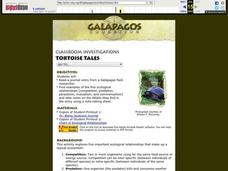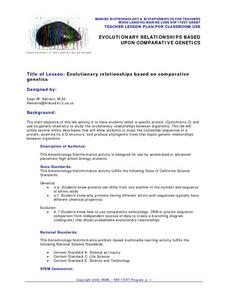Biology Junction
Ecology
Psychologists study human relationships while ecologist study relationships between organisms in the environment. An introduction to ecology and the related vocabulary benefits scholars as they progress through the presentation and...
Howard Hughes Medical Institute
Creating Chains and Webs to Model Ecological Relationships
The sustainability of an ecosystem depends on many factors and changes constantly. Young scholars consider these factors as they use a set of cards to create food webs. They review key scientific vocabulary such as predator, prey,...
Serendip
The Ecology of Lyme Disease
Areas that previously included no risk of Lyme disease now have cases every year. Scholars learn about the spread of Lyme disease and the relationship with ecological succession. Then, they discuss possible solutions using the known food...
Curated OER
Ecology
For use early in the year with your ecology class, this collection of slides introduces viewers to cycles in nature and relationships between organisms. There is a food web diagram, but the presentation is incomplete without any diagrams...
Curated OER
Ecology Terms Crossword
In this ecological principles learning exercise, students solve 20 clues in a crossword puzzle containing basic ecology definitions of organism interactions.
Curated OER
Measuring Rainfall and Relationships Between pH, Alkalinity and Suspended Solids in the Pago River
Eleventh graders test the pH and alkalinity of Pago River. For this ecology lesson, 11th graders collect data and use spreadsheet to graph results. They analyze and share their findings with the class.
Curated OER
Endangered Relationships
Students study the interrelationship between the horseshoe crab and red knot. In this ecology lesson, students explain why several species became extinct. They research about endangered species found in their region.
Curated OER
Ecology
For this ecology worksheet students complete a crossword puzzle that incorporates all of the ecological vocabulary in the word puzzle.
Curated OER
Plants and Ecosystems
The relationships within and between ecosystems can be explored. after examining an area for living and non-living things students complete the same examination in the forest ecosystem. Students identify abiotic and biotic elements in an...
Howard Hughes Medical Institute
Lesson 4: Gorongosa's Food Webs
Who eats who in the savannas of Africa? Explore trophic levels with part four of an eight-part series of lessons focused around Gorongosa National Park. After young explorers identify animals using trailcam images, they construct a food...
Curated OER
Establishing a Baseline Ecology of a Creek Ecosystem
Students investigate the physical, chemical and biological parameters necessary to establish an ecological baseline. Establishing an ecological baseline not only shows the ecological characteristics of a creek but makes the possible...
NOAA
Community Ecology and Sampling
Seamounts in the Coral and Tasman Seas are home to more than 850 different species. Groups explore hydrothermal vents, researching the organisms found there and their energy source. They also learn about seamounts, exploring their unique...
Curated OER
Bird Ecology Unit
Tenth graders conduct various activities utilizing the scientific method to formulate a hypothesis, conduct a controlled experiment, collect and analyze the data and communicate their results through a poster. They also identify...
Curated OER
Exploring the Natural World of the Balkan Peninsula
Students explore the different habitats in the Balkan peninsula. In this ecology lesson, students research about a species and create a 3D diorama of its environment. They present project in class and share their research findings.
Curated OER
Ecological Relationships
Young scholars identify ecological elements and their factors on species, populations and food webs. They analyze ecosystems for these elements and research how these factors influence species survival rate. Predictions on conditions...
Howard Hughes Medical Institute
Modeling Trophic Cascades
In the ecological game of who eats who, one small change can have a big impact! Individuals create food chains in an array of ecosystems, then determine what happens to organisms in the chain when one organism changes its feeding...
Chicago Botanic Garden
Ecological Mismatches
Modeling is a powerful teaching tool. The final installment in a six-part series has pupils complete an activity to model a food web and discover the interconnected relationships in an ecosystem. They then read about changes in migratory...
Curated OER
Ecological Pyramids
Students apply the ecological pyramids of numbers and biomass with an activity using topographic maps. In this trophic level lesson, students work in groups using a topographic map to determine the number of organisms that can live in an...
Curated OER
Exploring Ecosystems
Students examine the relationships between plants, animals, and the environment in ecosystems. They sort animal cards, collect natural materials from the schoolyard, and record an ecosystem web in the form of a poster.
Howard Hughes Medical Institute
Building Ecological Pyramids
Looking for a fresh take on traditional food/energy pyramids? Conduct an innovative activity where pupils build their own! The lesson uses research data from Gorongosa National Park in Mozambique for a real-life safari touch. Scholars...
Howard Hughes Medical Institute
Exploring Biomes in Gorongosa National Park
Diversity in a biome leads to some unique characteristics vital to the natural environment. Young scholars use an interactive map to explore the vegetation and climate of the Gorongosa National Park. They collect climate data to compare...
Curated OER
Trophic Ecology of Humans
students analyze the place of humans among the tropic levels by observing what we eat. They calculate the caloric content of several foods commonly eaten by humans and calculate the total energy cost to grow, process, transport, store...
Curated OER
Tortoise Tales
Students read journal entry from a Gal??pagos field researcher, find examples of five ecological relationships (competition, predation, parasitism, mutualism, and commensalism) and take notes on the details they find in the entry using a...
Curated OER
Evolutionary Relationships Based Upon Comparative Genetics
High schoolers investigate the protein cytochrome c in an attempt to use its genetic chemistry to study possible evolutionary relationships between organisms. The lesson integrates technology with the use computers to perform DNA analysis.


